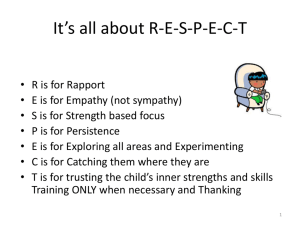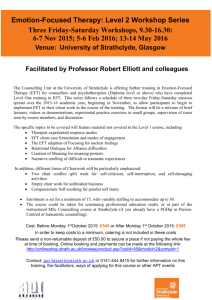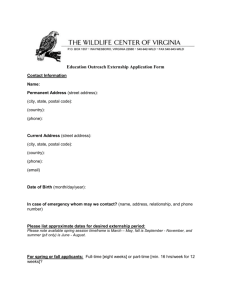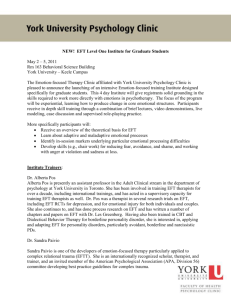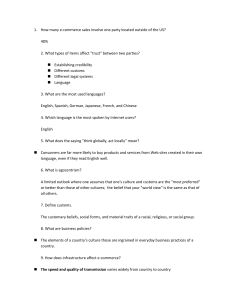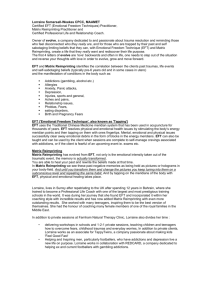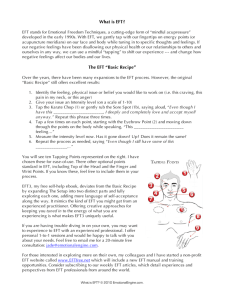focus - Hanna Levenson, Clinical Psychologist, Teacher, Researcher
advertisement
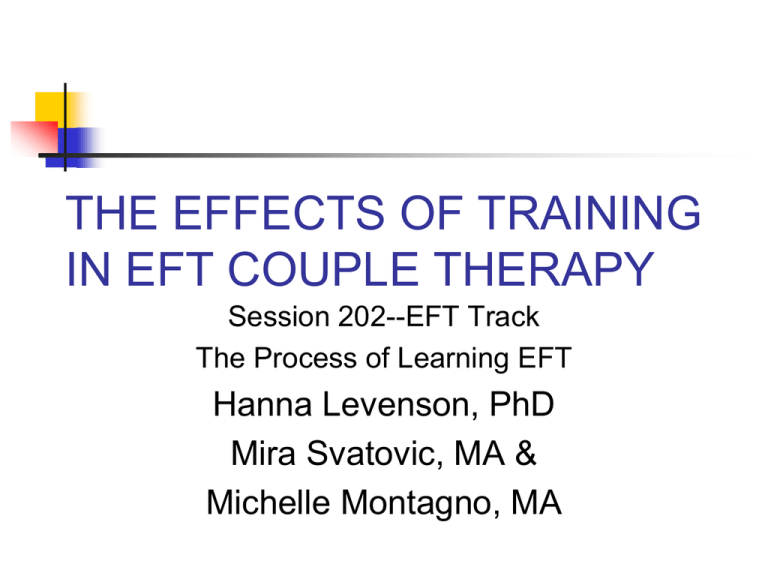
THE EFFECTS OF TRAINING IN EFT COUPLE THERAPY Session 202--EFT Track The Process of Learning EFT Hanna Levenson, PhD Mira Svatovic, MA & Michelle Montagno, MA There are no conclusive data on what makes psychotherapy training effective despite three decades of research on the topic. Even less is known about training in EFT. What are the Short-Term and Long-Term Effects of Taking the EFT Externship FOCUS FOR THE STUDIES We looked at professional and personal correlates of EFT training. FOCUS (con’t) Professional EFT information learned EFT skills learned FOCUS (con’t) Personal--because EFT is an attachment-based, emotionallyfocused, and nonjudgmental model, we looked at therapist’s: Attachment style Emotional processing Self-compassion EFT EXTERNSHIP Goals of training--learning to Understand partner distress from an attachment perspective Help partners reprocess emotional responses Shape new interactions/bonding events Overcome therapeutic impasses PROCEDURES FOR STUDY 1 Externships in Salt Lake City San Francisco Houston Los Angeles Ottawa PROCEDURES (con’t) 110 attendees took measures morning of Day 1 (Pre-training) & afternoon of Day 4 (Post-training) 76 attendees with complete data PROCEDURES (cont) FOLLOW-UP -- STUDY 2 Participants mailed measures 8 months (on average) after Externship. 49% sent back measures N = 29 attendees with complete data MEASURES DEMOGRAPHIC QUESTIONNAIRE Age Gender Relationship Status Theoretical Orientation How long practicing Degree MEASURES (con’t) EFT KNOWLEDGE AND COMPETENCY SCALE (EFT-KACS) Rate yourself (1-7) on how knowledgeable and competent you are on 12 items describing EFT skills “Creating safety in session and maintaining positive alliance.” “Using enactments therapeutically.” MEASURES (con’t) EXPERIENCES IN CLOSE RELATIONSHIPS (Fraley et al., 2000) Measures romantic attachment anxiety and avoidance “I am afraid I will lose my partner’s love.” “I don’t feel comfortable opening up.” MEASURES (con’t) SELF-COMPASSION SCALE (Neff, 2003) Measures self-kindness, common humanity, mindfulness “I’m tolerant of my own flaws and inadequacies.” “When times are tough, I tend to be tough on myself.” MEASURES (con’t) EMOTIONAL PROCESSING INVENTORY (Reid & Harper, 2008) Measures ability to identify, communicate, & regulate feelings. “I choose to keep my feelings private.” “I feel flooded and overwhelmed by my emotions.” MEASURES (con’t) OPEN-ENDED QUESTIONS Qualitative and quantitative data on personal relationships with self and others. “EFT training has changed the way I approach romantic relationships.” AVERAGE PARTICIPANT 47 years old Caucasian woman Partnered In practice almost 13 years MFT Integrative orientation AVERAGE PARTICIPANT Over 90% had read at least 1 EFT book Two-thirds had seen at least 1 EFT video More securely attached than a national sample PRELIMINARY ANALYSES Factor analysis of EFT-KACS-Three factors: Alliance (2 Items) Knowledge (10 items) Competency (10 items) PRELIMINARY ANALYSES No effects for training: training site age gender education . FINDINGS Study 1 Mira Svatovic Changes with Training 7 6 5 Pre-test 4 3 Post test 2 1 0 Knowledge Competence Alliance “This has certainly given me a map- when I work with couples I’ll have a sense of where we are going and how.” -EFT Externship Participant “Emotion is an area I naturally tune into but the training helped me to understand how to better heighten and use emotion as a process in therapy.” -EFT Externship Participant “I will work hard to slow things down, try even harder than I do now to stay out of the content and focus on process.” -EFT Externship Participant Self-Compassion Participants entered the training with mid-range levels of self-compassion with participant’s average score being 3.4 on a 5 point scale. Knowledge/Competence and Self-Compassion There were no direct changes in SelfCompassion scores related to training. Emotional Processing Participants entered the training with moderately high levels on emotional processing with participant’s average score being 3.9 on a 5 point scale at pretest. Competence and Emotional Processing As participants’ competence increased they became more open to processing their emotions. Emotional Processing and Self Compassion And as their openness to feelings increased, they became more self compassionate. “I understand much better why I am so deeply affected by things that happen in my relationship. I feel less inclined to be harsh with myself.” -EFT Externship Participant Long-Term Effects of Training Michelle Montagno THE FOLLOW-UP- STUDY 2 Average of 8 months post externship N = 29 FOLLOW-UP SAMPLE Extra training activities Extra Training 76% FOLLOW-UP RESULTS 7 6 5 Pre-Test Post-Test Follow-Up 4 3 2 1 Knowledge Competence Alliance ATTACHMENT ATTACHMENT FINDINGS The more avoidant someone was at the beginning of the externship, the less they were personally affected by the training at follow-up (r = -.43, p < .03). No significant findings regarding anxious attachment. EFFECT ON CLINICIANS’ PERSONAL LIVES Participants rated the greatest impact of training was on: their romantic relationships understanding of their life experiences relationships with others EFFECT ON ROMANTIC RELATIONSHIPS “I have a model now from which I not only see other romantic relationships, but also my own.” UNDERSTANDING LIFE EXPERIENCES “EFT has improved my understanding of my past relationships and relationship history.” RELATIONSHIPS WITH OTHERS “EFT has helped me link my own internal dynamics to an understanding of my early attachment experiences. These understandings have helped me in my marriage and other relationships.” CLINICIANS MOST PERSONALLY EFFECTED Older participants Those who learned the most in the externship CONCLUSIONS Our study suggests that the EFT externship creates positive and enduring changes in therapists’ professional and personal lives. Future work is needed to demonstrate the clinical relevancy of these findings. Thank You!
